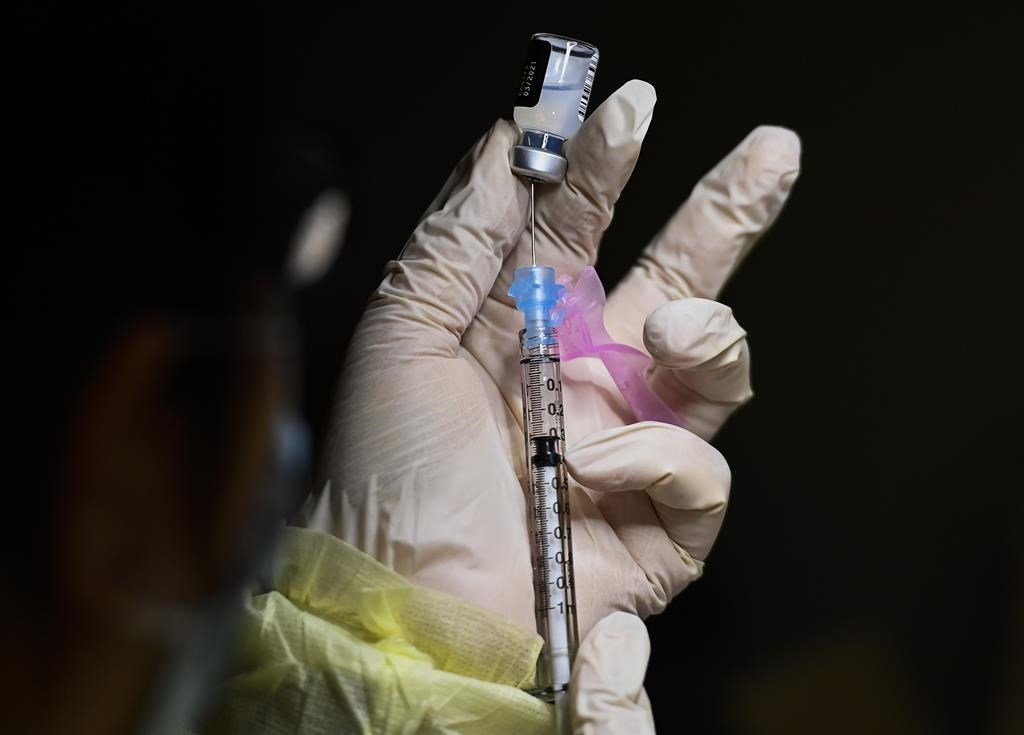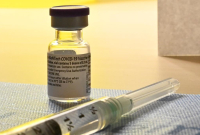Support strong Canadian climate journalism for 2025
Canada's vaccine rollout reached four more provinces on Wednesday, with health-care workers being inoculated against COVID-19 as officials warned hospitals in some areas are nearing a breaking point.
Nurses were first in line for the Pfizer-BioNTech shot in Nova Scotia and Newfoundland and Labrador, while Prince Edward Island administered the vaccine first to workers at a long-term care home and Manitoba bestowed the honour on an ICU doctor.
"It's an early Christmas present," said Ellen Foley-Vick, a public health nurse who was first to receive the vaccine in St. John's, N.L.
Masked onlookers applauded as she stood up and proclaimed that the shot didn't hurt a bit.
Haley Avery, who was among the first nurses to get the shot at Dalhousie University in Halifax, called the process "very uneventful," though she stressed she was excited and grateful to be vaccinated.
"There is certainly an element of trying to set a good example," Avery said. "I think it's fantastic that there are so many health-care workers who with very little thought, have stepped up to get the immunization because they know it is the right thing to do."
In Prince Edward Island, a resident care worker and a nurse at the Garden Home -- a long-term care facility -- got the first doses, along with a doctor who works at multiple nursing homes.
Dr. Brian Penner, who works at Winnipeg's Health Sciences Centre, was first to receive the shot in Manitoba.
Front-line health-care workers and staff and residents of long-term care homes are up first for vaccinations across much of the country.
Saskatchewan, Alberta and British Columbia began giving shots Tuesday, after the first ones in Canada were given in Ontario and Quebec on Monday.
Prime Minister Justin Trudeau has also said Canada is to get up to 168,000 doses of Moderna's vaccine by the end of December, ahead of schedule.
It has not yet been approved by Health Canada, but Trudeau has said deliveries could begin within 48 hours of getting the green light.
As it stands, officials are currently conducting a "dry run," practising the rollout before the vaccines arrive.
Maj.-Gen. Dany Fortin, charged with managing the logistics of delivering vaccines across the country, said this week's rollout has been a success.
"The first deliveries went exactly according to plan," he said.
But Dr. Howard Njoo, Canada's deputy chief public health officer, warned that the vaccination campaign doesn't spell the immediate end of the pandemic.
"We are not at the end of living with COVID-19. Rather, we are at the beginning of the end," he said. "As welcome as news of a first vaccine for Canadians may be, it is crucial for Canadians to continue following the guidance of their local public health authorities, and to keep up with individual public health practices."
News out of Ontario brought that reality into stark relief as the province urged hospitals in COVID-19 hot spots to prepare to use their "surge capacity" within 48 hours as diagnoses soar.
The province recorded 2,139 new cases of the virus on Wednesday, marking the second straight day of 2,000-plus cases in Ontario. It also counted 43 new deaths.
The CEO of Ontario Health, which co-ordinates several agencies in the province's health-care system, made the request in a memo to hospitals.
"Our ability to care for patients (COVID and non-COVID alike) is being challenged, so we are asking hospitals to work together, even more, to ensure we can continue to have the bed capacity to care for patients, safely and effectively," Matt Anderson wrote in the letter issued Tuesday.
He asked hospitals in the province's lockdown and red zones to ensure they have at least 10 to 15 per cent surge capacity for adult COVID-19 patients.
Manitoba, too, warned that the virus was straining its hospitals as it recorded 292 cases of the virus and 15 more deaths.
"We're not out of the woods. We're nowhere near out of the woods. Our hospitals are filled with COVID-19 at the present time," said Dr. Jazz Atwal, the province's acting deputy chief public health officer.
"We're going to see our hospitals continue to be busy," he said. "We have a number of communities with large outbreaks where they will generate hospitalizations."
On Wednesday, Saskatchewan recorded 169 new cases of COVID-19.
Alberta reported 1,270 new infections, one of its lowest daily counts in days, and 16 additional deaths. It said 749 people were in hospital, and 139 of those were in intensive care.
Chief medical health officer Dr. Deena Hinshaw said Alberta Health Services was working with the Canadian Red Cross to set up an alternate care centre in Edmonton's Butterdome arena with 100 beds should they be needed.
In British Columbia, Solicitor General Mike Farnworth said gaming investigators, conservation officers, and liquor and cannabis inspectors are being asked to support the police and increase enforcement of health orders related to COVID-19.
The province is also asking WorkSafeBC to increase workplace inspections.
The government reported 640 new cases of COVID-19 on Wednesday and 24 additional deaths.
B.C. also said it administered 409 doses of the Pfizer-BioNTech vaccine on Tuesday, the first day of its immunization program.
Nova Scotia counted four new cases of COVID-19, while New Brunswick logged eight and Newfoundland and Labrador reported five.
As of Tuesday night, more than 475,000 Canadians had been diagnosed with the virus. Upwards of 13,650 have died.
This report by The Canadian Press was first published Dec. 16, 2020.





Comments